Fleurs du Mal Magazine


Or see the index
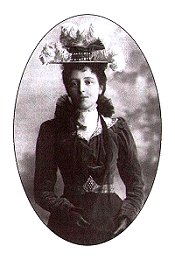
Lucy Maud Montgomery
(1874 – 1942)
As the Heart Hopes
It is a year dear one, since you afar
Went out beyond my yearning mortal sight
A wondrous year! perchance in many a star
You have sojourned, or basked within the light
Of mightier suns; it may be you have trod
The glittering pathways of the Pleiades,
And through the Milky Way’s white mysteries
Have walked at will, fire-shod.
You may have gazed in the immortal eyes
Of prophets and of martyrs; talked with seers
Learned in all the lore of Paradise,
The infinite wisdom of eternal years;
To you the Sons of Morning may have sung,
The impassioned strophes of their matin hymn,
For you the choirs of the seraphim
Their harpings wild out-flung.
But still I think at eve you come to me
For old, delightsome speech of eye and lip,
Deeming our mutual converse thus to be
Fairer than archangelic comradeship;
Dearer our close communings fondly given
Than all the rainbow dreams a spirit knows,
Sweeter my gathered violets than the rose
Upon the hills of heaven.
Can any exquisite, unearthly morn,
Silverly breaking o’er a starry plain,
Give to your soul the poignant pleasure born
Of virgin moon and sunset’s lustrous stain
When we together watch them ? Oh, apart
A hundred universes you may roam,
But still I knowI knowyour only home
Is here within my heart!
Lucy Maud Montgomery poetry
fleursdumal.nl magazine
More in: Archive M-N, CLASSIC POETRY
 AMALGAAM een nieuwe Afrikaans/Nederlandse Dichtbundel
AMALGAAM een nieuwe Afrikaans/Nederlandse Dichtbundel
AMALGAAM is een duobundel met gedichten geschreven in het Nederlands (door Willy Martin) en in het Afrikaans (door Carina van der Walt).
AMALGAAM verschijnt in oktober bij Uitgeverij IJzer in Utrecht.
AMALGAAM bevat Afrikaans- en Nederlandstalige gedichten die niet per taal gescheiden, maar alfabetisch op titel gerangschikt staan.
Net zoals in ANNA (2011, Groot Woordenboek Afrikaans en Nederlands) zijn de gedichten uit de twee talen ‘geamalgameerd’, samen behandeld, als waren zij van één en dezelfde taal. Amalgamatie heeft voor de auteurs het voordeel dat zowel taalkundig als letterkundig grenzen kunnen worden afgetast en overschreden. De talen krijgen hun natuurlijke plaats in een vlechtwerk van verschuivende betekenissen. De nevenschikking van de talen zorgt ervoor dat latente krachten in beide talen helder in zicht komen. Niet alleen de verklarende kracht van woorden, maar ook de poëtische glans kan erdoor uitgelicht worden.
De Afrikaanstalige gedichten zijn van de hand van de Zuid-Afrikaanse dichteres en essayist Carina van der Walt, de Nederlandstalige van de Vlaming Willy Martin, emeritus hoogleraar aan de Vrije Universiteit te Amsterdam en hoofdredacteur van ANNA.
De officiële bundelpresentatie is op zondag 13 september 2015 om 11:00 uur Abdij Roosendael te Sint-Katelijne-Waver (bij Mechelen)
Gedichten en muzikale omlijsting zullen in het mooie kader van het abdijdomein aan het geheel een feestelijk karakter geven. Katelijne Boon (Vlaamse Radio en Televisieomroep, bekend van “De Ambassadeurs” op Klara) zal de auteurs interviewen en het programma coördineren.
Willy Martin & Carina van der Walt
Amalgaam
Prijs € 15,-
95 pag.
ISBN 978 90 8684 117 2
Verschijnt oktober 2015
Uitgeverij Ijzer, Utrecht
website: http://www.uitgeverij-ijzer.nl/
fleursdumal.nl magazine
More in: Archive M-N, Archive W-X, Art & Literature News, Carina van der Walt, TRANSLATION ARCHIVE, Walt, Carina van der, Willy Martin

Don Marquis
(1878 – 1937)
A Rhyme Of The Roads
Pearl-Slashed and purple and crimson and
fringed with gray mist of the hills,
The pennons of morning advance to the music of
rock-fretted rills,
The dumb forest quickens to song, and the little
gusts shout as they fling
A floor-cloth of orchard bloom down for the flash-
ing, quick feet of the Spring.
To the road, gipsy-heart, thou and I! ’Tis the
mad piper, Spring, who is leading;
’Tis the pulse of his piping that throbs through
the brain, irresistibly pleading;
Full-blossomed, deep-bosomed, fain woman, light-
footed, lute-throated and fleet,
We have drunk of the wine of this Wanderer’s song;
let us follow his feet!
Like raveled red girdles flung down by some
hoidenish goddess in mirth
The tangled roads reach from rim unto utter-
most rim of the earth—
We will weave of these strands a strong net, we
will snare the bright wings of delight,—
We will make of these strings a sweet lute that
will shame the low wind-harps of night.
The clamor of tongues and the clangor of trades
in the peevish packed street,
The arrogant, jangling Nothings, with iterant, dis-
sonant beat,
The clattering, senseless endeavor with dross of
mere gold for its goal,
These have sickened the senses and wearied the
brain and straitened the soul.
“Come forth and be cleansed of the folly of strife
for things worthless of strife,
Come forth and gain life and grasp God by fore-
going gains worthless of life”—
It was thus spake the wizard wildwood, low-
voiced to the hearkening heart,
It was thus sang the jovial hills, and the harper
sun bore part.
O woman, whose blood as my blood with the fire
of the Spring is aflame,
We did well, when the red roads called, that we
heeded the call and came—
Came forth to the sweet wise silence where soul
may speak sooth unto soul,
Vine-wreathed and vagabond Love, with the goal
of Nowhere for our goal!
What planet-crowned Dusk that wanders the
steeps of our firmament there
Hath gems that may match with the dew-opals
meshed in thine opulent hair?
What wind-witch that skims the curled billows
with feet they are fain to caress
Hath sandals so wing’d as thine art with a god-
like carelessness?
And dare we not dream this is heaven?—to wan-
der thus on, ever on.
Through the hush-heavy valleys of space, up the
flushing red slopes of the dawn?—
For none that seeks rest shall find rest till he
ceaseth his striving for rest,
And the gain of the quest is the joy of the road
that allures to the quest.
Don Marquis poetry
fleursdumal.nl magazine
More in: Archive M-N, CLASSIC POETRY

Lucy Maud Montgomery
(1874 – 1942)
The Poet’s Thought
It came to him in rainbow dreams,
Blent with the wisdom of the sages,
Of spirit and of passion born;
In words as lucent as the morn
He prisoned it, and now it gleams
A jewel shining through the ages.
Lucy Maud Montgomery poetry
fleursdumal.nl magazine
More in: Archive M-N, CLASSIC POETRY
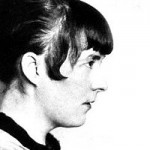
Katherine Mansfield
(1888 – 1923)
Sea
The Sea called—I lay on the rocks and said:
“I am come.”
She mocked and showed her teeth,
Stretching out her long green arms.
“Go away!” she thundered.
“Then tell me what I am to do,” I begged.
“If I leave you, you will not be silent,
But cry my name in the cities
And wistfully entreat me in the plains and forests;
All else I forsake to come to you—what must I do?”
“Never have I uttered your name,” snarled the Sea.
“There is no more of me in your body
Than the little salt tears you are frightened of shedding.
What can you know of my love on your brown rock
pillow….
Come closer.”
Katherine Mansfield poetry
fleursdumal.nl magazine
More in: Archive M-N, Katherine Mansfield, Mansfield, Katherine

Don Marquis
(1878 – 1937)
Lower New York – a Storm
White wing’d below the darkling clouds
The driven sea-gulls wheel;
The roused sea flings a storm against
The towers of stone and steel.
The very voice of ocean rings
Along the shaken street—
Dusk, storm, and beauty whelm the world
Where sea and city meet—
But what care they for flashing wings,
Quick beauty, loud refrain,
These huddled thousands, deaf and blind
To all but greed and gain?
Don Marquis poetry
fleursdumal.nl magazine
More in: Archive M-N, CLASSIC POETRY

Lucy Maud Montgomery
(1874 – 1942)
With Tears They Buried You Today
With tears they buried you to-day,
But well I knew no turf could hold
Your gladness long beneath the mould,
Or cramp your laughter in the clay;
I smiled while others wept for you
Because I knew.
And now you sit with me to-night
Here in our old, accustomed place;
Tender and mirthful is your face,
Your eyes with starry joy are bright
Oh, you are merry as a song
For love is strong!
They think of you as lying there
Down in the churchyard grim and old;
They think of you as mute and cold,
A wan, white thing that once was fair,
With dim, sealed eyes that never may
Look on the day.
But love cannot be coffined so
In clod and darkness; it must rise
And seek its own in radiant guise,
With immortality aglow,
Making of death’s triumphant sting
A little thing.
Ay, we shall laugh at those who deem
Our hearts are sundered! Listen, sweet,
The tripping of the wind’s swift feet
Along the by-ways of our dream,
And hark the whisper of the rose
Wilding that blows.
Oh, still you love those simple things,
And still you love them more with me;
The grave has won no victory;
It could not clasp your shining wings,
It could not keep you from my side,
Dear and my bride!
Lucy Maud Montgomery poetry
fleursdumal.nl magazine
More in: Archive M-N, CLASSIC POETRY
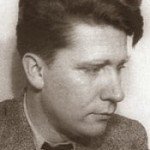
Hendrik Marsman
(1899-1940)
Slapende vrouw
De onrust en de lichtbewogen
ontvanklijkheid van hare trekken
zijn weggewist en overtogen
door maanlicht, dat in zachte plekken
gestort ligt over kruin en peluw —
en dekens die haar slaap bedekken
welven het maanlicht tot een landschap,
een keten die zijn tere bekkens
van zilverglans doet overstromen —
hoe lieflijk droomt het hoofd daarboven:
de mond, die vlinders niet zou wekken
is vaag geopend en de ogen
die overdag het leven vingen
liggen behoedzaam nu geloken
tussen de ijle zwarte veren
van wimpers en van wenkbrauwbogen.
(Uit: Porta Nigra (1934))
Hendrik Marsman poetry
fleursdumal.nl magazine
More in: Archive M-N, Marsman, Hendrik
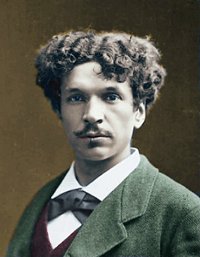
Charles Cros
(1842 – 1888)
Le meuble – Fantaisie
A Madame Mauté de Fleurville.
Il m’a fallu avoir le regard bien rapide, l’oreille bien fine, l’attention bien aiguisée,
Pour découvrir le mystère du meuble, pour pénétrer derrière les perspectives de marqueterie, pour atteindre le monde imaginaire à travers les petites glaces.
Mais j’ai enfin entrevu la fête clandestine, j’ai entendu les menuets minuscules, j’ai surpris les intrigues compliquées qui se trament dans le meuble.
On ouvre les battants, on voit comme un salon pour des insectes, on remarque les carrelages blancs, bruns et noirs en perspective exagérée.
Une glace au milieu, une glace à droite, une glace à gauche, comme les portes dans les comédies symétriques.
En vérité ces glaces sont des portes ouvertes sur l’imaginaire.
Mais une solitude évidemment inaccoutumée, une propreté dont on cherche le but en ce salon où il n’y a personne, un luxe sans raison pour un intérieur où ne régnerait que la nuit.
On est dupe de cela, on se dit « c’est un meuble et voilà tout, » on pense qu’il n’y a rien derrière les glaces que le reflet de ce qui leur est présenté.
Insinuations qui viennent de quelque part, mensonges soufflés à notre raison par une politique voulue, ignorances où nous tiennent certains intérêts que je n’ai pas à définir.
Pourtant je n’y veux plus mettre de prudence, je me moque de ce qui peut en arriver, je n’ai pas souci des rancunes fantastiques.
Quand le meuble est fermé, quand l’oreille des importuns est bouchée par le sommeil ou remplie des bruits extérieurs, quand la pensée des hommes s’appesantit sur quelque objet positif,
Alors d’étranges scènes se passent dans le salon du meuble; quelques personnages de taille et d’aspect insolites sortent des petites glaces; certains groupes, éclairés par des lueurs vagues, s’agitent en ces perspectives exagérées.
Des profondeurs de la marqueterie, de derrière les colonnades simulées, du fond des couloirs postiches ménagés dans le revers des battants,
S’avancent, en toilettes surannées, avec une démarche frétillante et pour une fête d’almanach extraterrestre,
Des élégants d’une époque de rêve, des jeunes filles cherchant un établissement en cette société de reflets et enfin les vieux parents, diplomates ventrus et douairières couperosées.
Sur le mur de bois poli, accrochées on ne sait comment, les girandoles s’allument.
Au milieu de la salle, pendu au plafond qui n’existe pas, resplendit un lustre surchargé de bougies roses, grosses et longues comme des cornes de limaçons.
Dans des cheminées imprévues, des feux flambent comme des vers luisants.
Qui a mis là ces fauteuils, profonds comme des coques de noisettes et disposés en cercle, ces tables surchargées de rafraîchissements immatériels ou d’enjeux microscopiques, ces rideaux somptueux — et lourds comme des toiles d’araignée?
Mais le bal commence.
L’orchestre, qu’on croirait composé de hannetons, jette ses notes, pétillements et sifflements imperceptibles.
Les jeunes gens se donnent la main et se font des révérences.
Peut-être même quelques baisers d’amour fictif s’échangent à la dérobée, des sourires sans idée se dissimulent sous les éventails en ailes de mouche, des fleurs fanées dans les corsages sont demandées et données en signe d’indifférence réciproque.
Combien cela dure-t-il?
Quelles causeries s’élèvent dans ces fêtes?
Où va ce monde sans substance, après la soirée?
On ne sait pas.
Puisque, si l’on ouvre le meuble, les lumières et les feux s’éteignent: les invités, élégants, coquettes et vieux parents disparaissent pêle-mêle, sans souci de leur dignité, dans les glaces, couloirs et colonnades; les fauteuils, les tables et les rideaux s’évaporent.
Et le salon reste vide, silencieux et propre;
Aussi tout le monde le dit « c’est un meuble de marqueterie et voilà tout, » sans se douter qu’aussitôt le regard détourné.
De petits visages narquois se hasardent à sortir des glaces symétriques, de derrière les colonnes incrustées, du fond des couloirs postiches.
Et il faut un œil particulièrement exercé, minutieux et rapide, pour les surprendre quand ils s’éloignent en ces perspectives exagérées, lorsqu’ils se réfugient dans les profondeurs imaginaires des petites glaces, à l’instant où ils rentrent dans les cachettes irréelles du bois poli.
Charles Cros poetry
fleursdumal.nl magazine
More in: Archive M-N, Cros, Charles
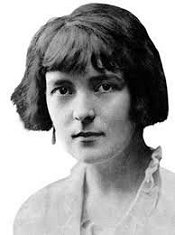
Katherine Mansfield
(1888 – 1923)
Sleeping Together
Sleeping together… how tired you were…
How warm our room… how the firelight spread
On walls and ceiling and great white bed!
We spoke in whispers as children do,
And now it was I—and then it was you
Slept a moment, to wake—”My dear,
I’m not at all sleepy,” one of us said….
Was it a thousand years ago?
I woke in your arms—you were sound asleep—
And heard the pattering sound of sheep.
Softly I slipped to the floor and crept
To the curtained window, then, while you slept,
I watched the sheep pass by in the snow.
O flock of thoughts with their shepherd Fear
Shivering, desolate, out in the cold,
That entered into my heart to fold!
A thousand years… was it yesterday
When we two children of far away,
Clinging close in the darkness, lay
Sleeping together?… How tired you were….
Katherine Mansfield poetry
fleursdumal.nl magazine
More in: Archive M-N, Katherine Mansfield, Mansfield, Katherine
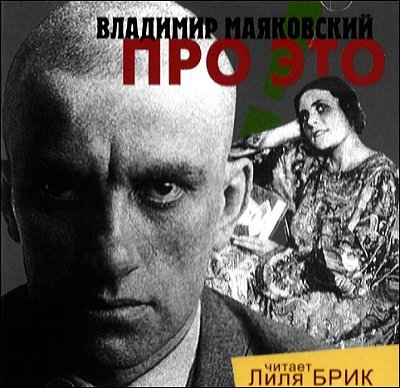
Vladimir Vladimirovitsj Majakovsky
Владимир Владимирович Маяковский
(1893-1930)
А вы могли бы?
Я сразу смазал карту будня,
плеснувши краску из стакана;
я показал на блюде студня
косые скулы океана.
На чешуе жестяной рыбы
прочел я зовы новых губ.
А вы
ноктюрн сыграть
могли бы
на флейте водосточных труб?
(1913)
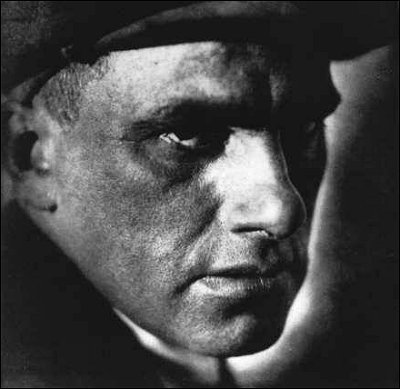


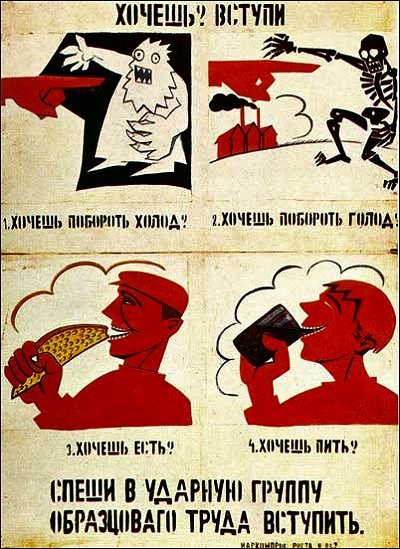
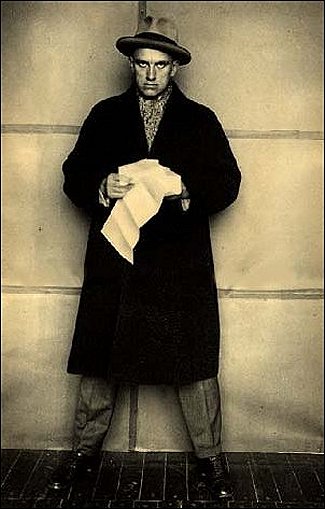
Vladimir Majakovsky poetry
fleursdumal.nl magazine
More in: Archive M-N, Constructivism, Majakovsky, Vladimir

Don Marquis
(1878 – 1937)
Dickens
“The only book that the party had was a volume of Dickens.
During the six months that they lay in the cave which they
had hacked in the ice, waiting for spring to come, they read
this volume through again and again.”—From a
newspaper report of an antarctic expedition.
Huddled within their savage lair
They hearkened to the prowling wind;
They heard the loud wings of despair . . .
And madness beat against the mind. . . .
A sunless world stretched stark outside
As if it had cursed God and died;
Dumb plains lay prone beneath the weight
Of cold unutterably great;
Iron ice bound all the bitter seas,
The brutal hills were bleak as hate. . . .
Here none but Death might walk at ease!
Then Dickens spoke, and, lo! the vast
Unpeopled void stirred into life;
The dead world quickened, the mad blast
Hushed for an hour its idiot strife
With nothingness. . . .
And from the gloom,
Parting the flaps of frozen skin,
Old friends and dear came trooping in,
And light and laughter filled the room. . . .
Voices and faces, shapes beloved,
Babbling lips and kindly eyes,
Not ghosts, but friends that lived and moved . . .
They brought the sun from other skies,
They wrought the magic that dispels
The bitterer part of loneliness . . .
And when they vanished each man dreamed
His dream there in the wilderness. . . .
One heard the chime of Christmas bells,
And, staring down a country lane,
Saw bright against the window-pane
The firelight beckon warm and red. . . .
And one turned from the waterside
Where Thames rolls down his slothful tide
To breast the human sea that beats
Through roaring London’s battered streets
And revel in the moods of men. . . .
And one saw all the April hills
Made glad with golden daffodils,
And found and kissed his love again. . . .
. . . . . .
By all the troubled hearts he cheers
In homely ways or by lost trails,
By all light shed through all dark years
When hope grows sick and courage quails,
We hail him first among his peers;
Whether we sorrow, sing, or feast,
He, too, hath known and understood—
Master of many moods, high priest
Of mirth and lord of cleansing tears!
Don Marquis poetry
fleursdumal.nl magazine
More in: Archive M-N, Charles Dickens, CLASSIC POETRY
Thank you for reading Fleurs du Mal - magazine for art & literature